On April 18, the first Leadership Trends Summit took place in a hybrid format: stationary – in the Warsaw office of the international law firm CMS located in Varso Tower – and online. A total of 340 people attended the event.
The main motivation for organizing it was the changing labor market and its challenges – both for HR departments and management. Combining the most important trends in the management field with the solutions that Kingmakers’ experts can offer resulted in a conference that is sure to become a permanent fixture on the HR calendar.
The opening of the conference belonged to Kingmakers Managing Partners Anna Pyrek and Szymon Herbec. They not only introduced the participants to the subject matter of the meeting, but also gave it an unusual atmosphere from the spot, being a combination of knowledge and experience on the one hand, and on the other – a sense of humor, distance and great kindness to others.
The conference was divided into 4 thematic blocks, which each time began or ended with a panel discussion with invited guests – experts from Polish and international organizations who shared their experience and best professional practices.
Individualizing leadership, or the hardships of managing in today’s reality
The topic of the first speech was the individualization of leadership. Anna Pyrek, Accredited Executive Coach ICF MCC & Mentor, and Sandra Subel, Global Head of Diversity and Inclusion Strategy / Axel Springer SE, shared their knowledge in this area.
The main conclusion of this part of the meeting was about the huge role that rests on the leader at the center of the organization today and the need to support him in this function. – A mid-level leadership person is the most difficult role in an organization, and it is extremely difficult to perform today. Managers are tired of diversity – they need to approach everyone individually, but they themselves also want to be treated uniquely. They really feel alone in this leadership of theirs – Anna Pyrek emphasized.
Based on meticulously discussed key trends in employee management, she pointed out what competencies managers need and will need to meet the challenges of leading diverse teams, creating an inclusive work environment, and at the same time finding pleasure and satisfaction at work.
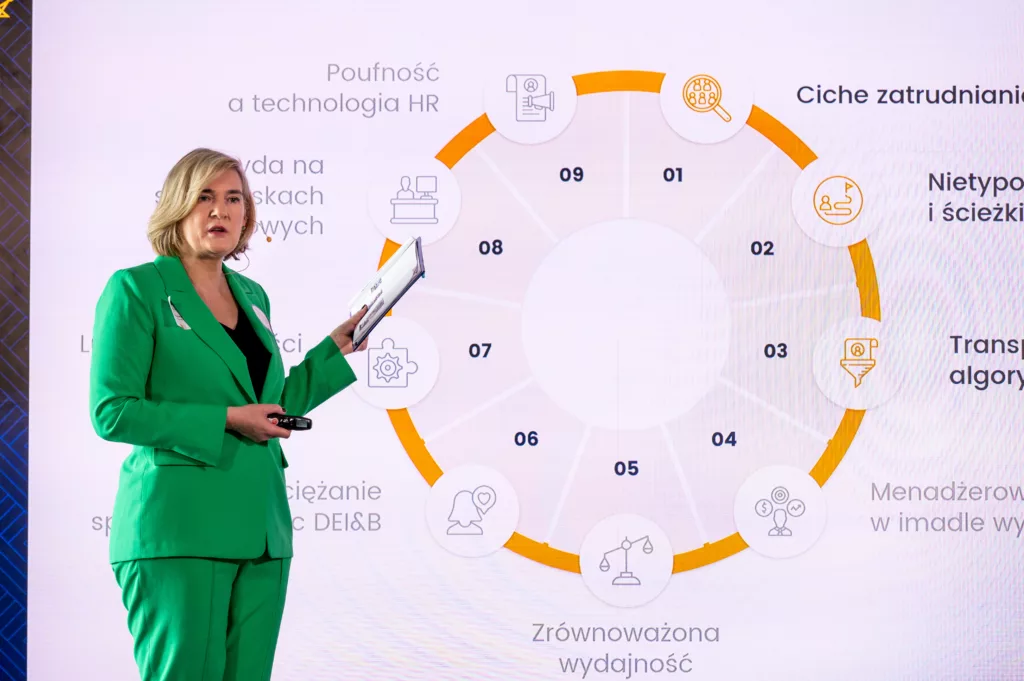
Sandra Subel, on the other hand, paid special attention to the systemic approach to inclusivity and tested methods of implementing it in the company. Sharing her experiences, she showed how to create a good DEI&B strategy and implement it. In the plethora of good practices, however, it is important to remember that the process is long and never really ends.
In a panel discussion, Michal Kowalewski, Commercial Financing Tribe Lead at Santander Bank Poland, Piotr Lipa, HR Director and Board Member at UNIQA Poland, and Sandra Subel exchanged opinions supported by their own experiences on whether it is possible, and if so, how to be attentive and employee-focused while managing teams of several dozen people, and how to implement the principles of Diversity, Equity, Inclusion while gaining the support of key people in the organization.
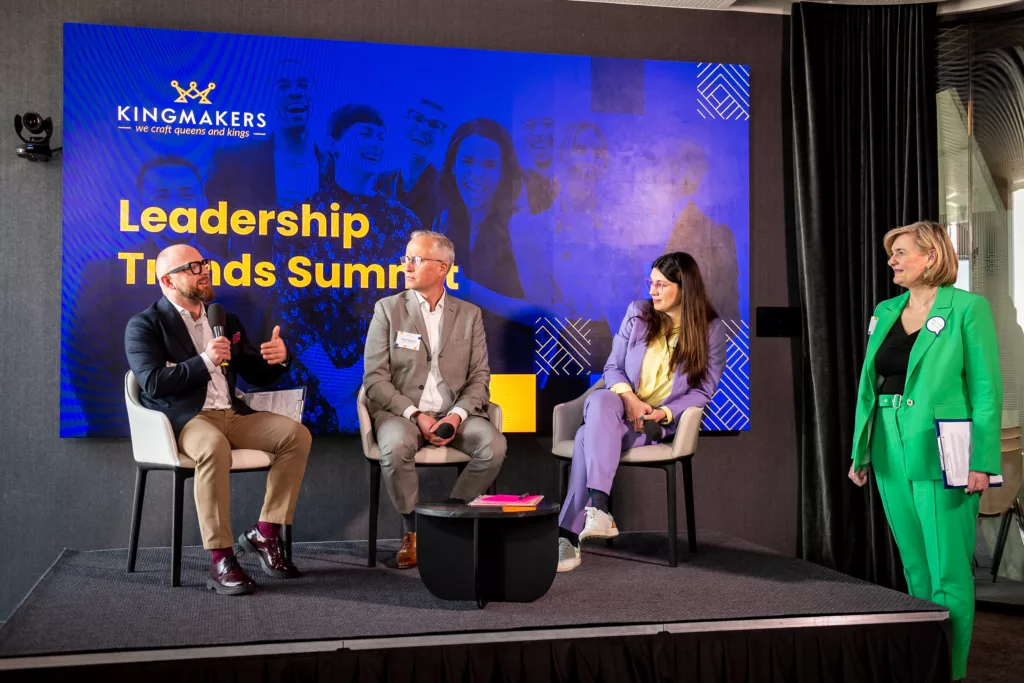
Working in a hybrid, or how not to go crazy in the diversity of communication
The second speech discussed all the challenges of hybrid work and managing diverse teams, including. Intercultural or intergenerational. The lecture was led by Agnieszka Kropacz, Senior Consultant for the Company. Kingmakers Corporate Clients, ICF ACC coach and trainer and Adrianna Wardzala, Kingmakers marketing manager and trainer.
During their speech, you could not only learn about the characteristics of all generations in the labor market and methods for effectively reaching them with your message, but also find out what type of manager you are and how to effectively communicate with employees, using available technologies. The connector’s role is proving crucial here.
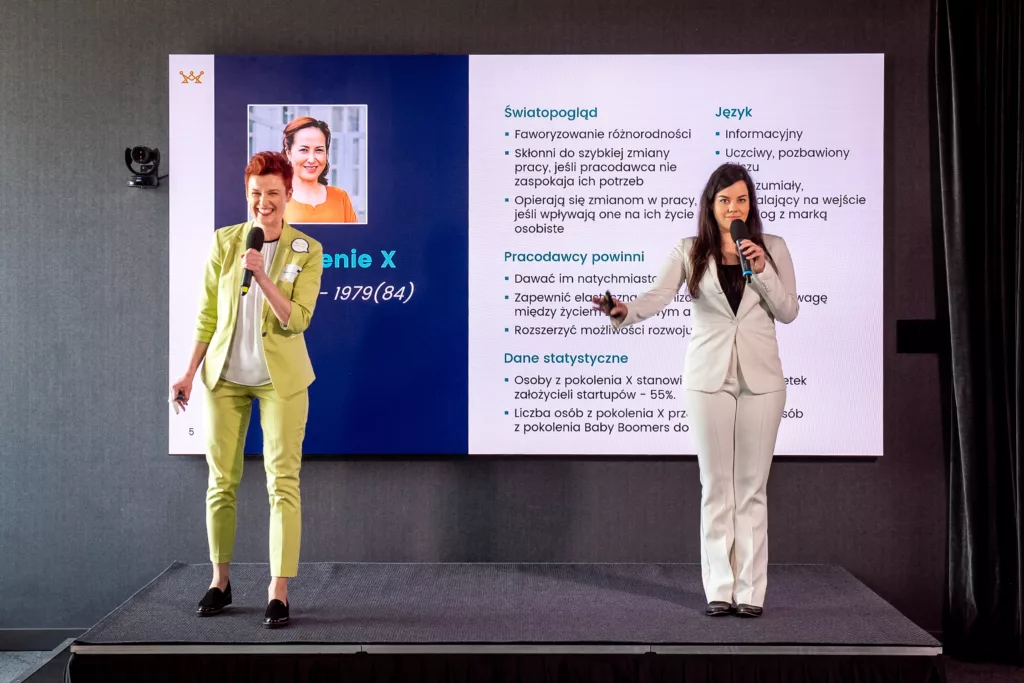
The speech continued with a panel discussion, which included Agnieszka Błaś, Head of International Operations at DHL Express Romania, Krzysztof Lis, CEO of Callstack, and Martyna Tochowicz, Director of Talent & Culture at Huuuge Games.
Agnieszka Blas working in an international team, despite being used to working remotely, admitted that the biggest leadership challenge is to be well understood. Therefore, asking questions, inquiring and seeking confirmation of understanding of the information is, in her opinion, an important part of every manager’s job, especially when dealing with younger generations.
According to Martyna Tochowicz, on the other hand, working in a hybrid environment also requires intensive work with oneself as a manager. Even more so if online communication is not natural to him. Krzysztof Lis made no secret of the importance of face-to-face meetings and the opportunity to talk not only about work, but also about life in general. For him, being empathetic is possible in any situation.
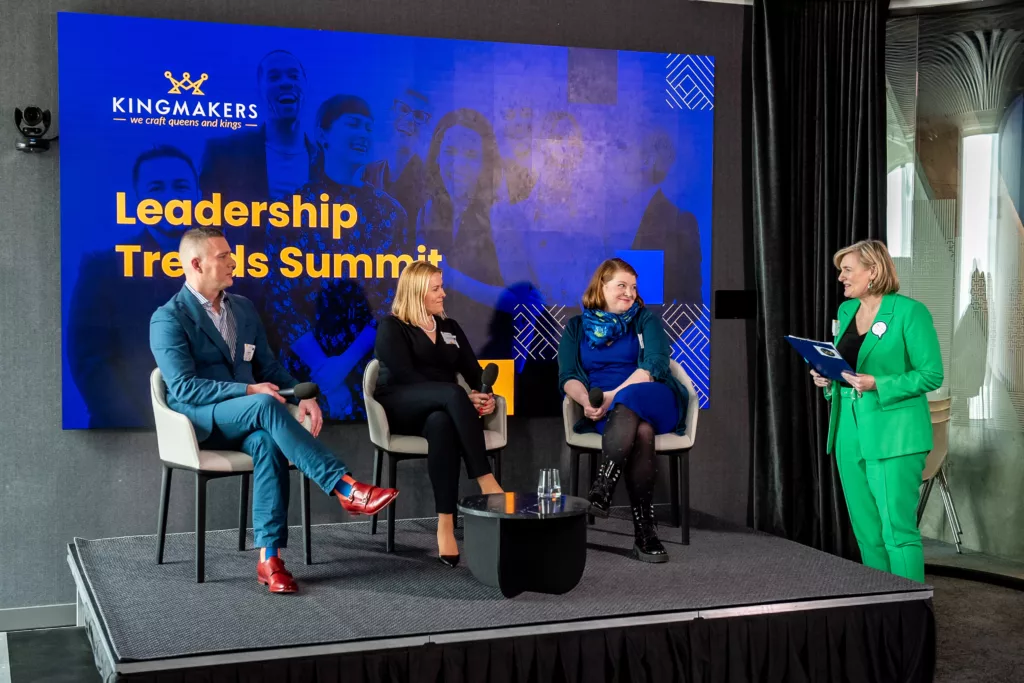
After two intensive thematic blocks, it was time for lunch. It was also a great opportunity to network and test VR solutions offered by event partner Metaskills.
Mentoring is not a cure for all ills
After the break, the third part of the conference began, this time on mentoring programs – the wisdom of introducing them in the organization, implementation and best practices.
The module began with a panel discussion, to which three leaders were invited: Agnieszka Żmuda-Kleśta, Talent Management Director at Kompania Piwowarska, Anna Trochim, Head of HR Poland at Cushman & Wakefield, and Donata Izdebska, HR Manager at Kompania Piwowarska. Development Programs at BNP Paribas Bank Poland. The panel was moderated by Margaret Sztejter, EMCC EIA Senior Practitioner, Accredited Executive Coach & Mentor Kingmakers.
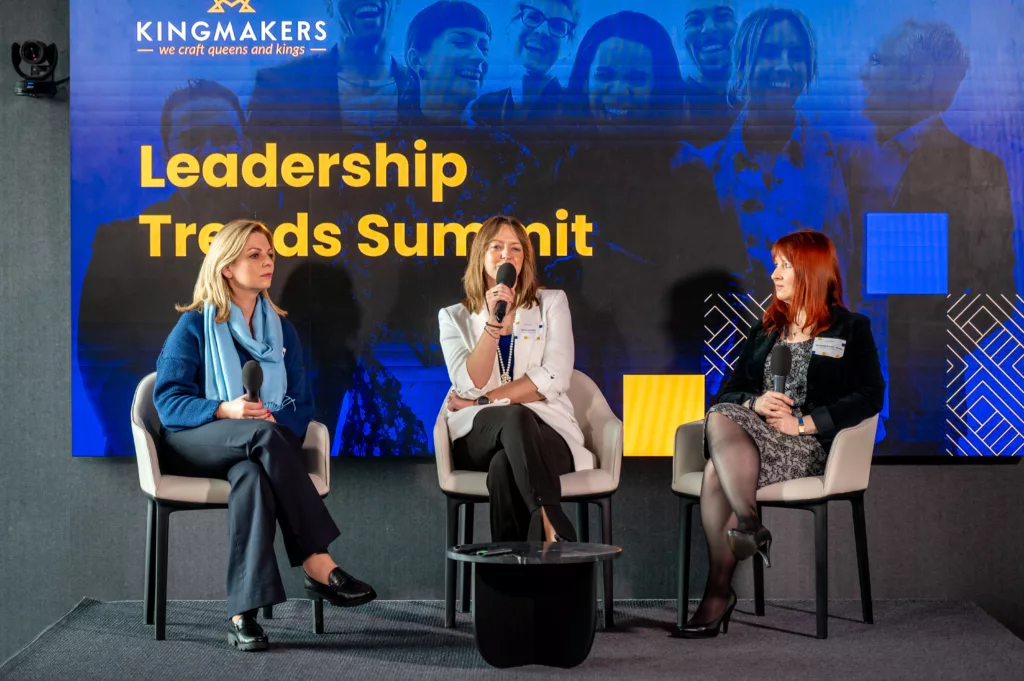
The conversation centered around mentoring programs implemented at the panelists’ companies. Each of them told their story and shared advice on what to do to make such a program a success. Among their advice were. Such insights as the need to define the purpose of the program, find allies within the company, as well as the funds necessary for implementation, properly present the idea and the methods by which one wants to achieve the goal, or properly communicate this within the organization.
They all openly said that participating in a mentoring program is not for everyone, and taking on this challenge comes with taking responsibility and consciously participating by being a mentor as well as mentees.
– Mentoring is a selective process that requires conscious participation. After all, it is not a remedy for all pains and problems – Agnieszka Żmuda-Kleśta concluded. In a similar vein, Donata Izdebska said: -. Mentees joining the program need to know why they want to do it. Mentoring is not a patch on everything. They need to know if they have a development goal, if they know what they want.
In turn, Anna Trochim noted the importance of proper communication: – Very important in implementing mentoring programs is proper communication to understand what the program is about. Leaders who have been in their roles many years in the organization assume in advance that they know what mentoring is. They think they will share their experience, teach the mentee how to act. And yet, that is not the point.
The mentoring part ended with a speech by Aldona Królikowska ICF PCC, EMCC EIA Senior Practitioner, Executive & Team Coach, Kingmakers Mentor, and Szymon Herbec, COO Kingmakers, ICF PCC Executive & Team Coach, Mentor, Coach, Supervisor, who conveyed their knowledge and shared their experiences in a very substantive yet humorous tone.

They provided comprehensive answers to questions such as: how to make a mentoring program successful and part of a company’s DNA, how to build communication so that employees want to participate in a mentoring program, and what to do so that the right people apply to a mentoring program.
In their view – as well as that of the earlier panelists – mentoring programs are not for everyone and will not work for every problematic situation. Also, not everyone is suited to be a mentor and properly fulfill the role given to them.
Participation – the key to leadership success
The final part of the conference on participatory leadership belonged to Agnieszka Kropacz, who spoke earlier, and Tomasz Slawinski, ICF PCC Executive & Team Coach, mentor, coach, supervisor of Kingmakers.
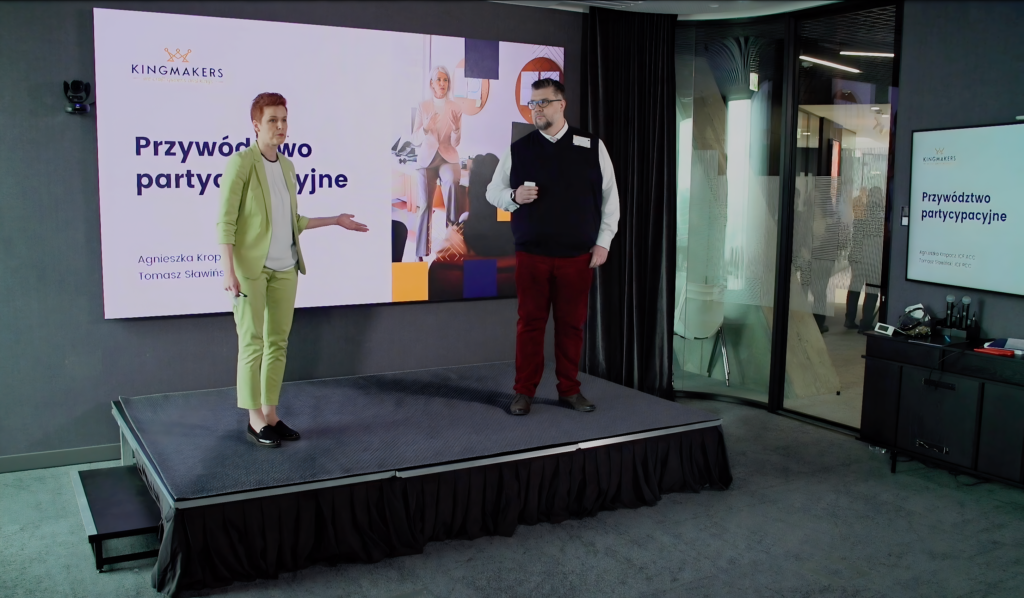
Why does this management style have an unquestionable advantage over others? What distinguishes a participative leader and how does this approach cascade to employees? These are questions that the presenters answered not only by giving a series of arguments, but also by supporting them with examples. Participants were also able to test their readiness for participatory leadership and determine what level of participation the team or organization they lead is at.
The icing on the cake of this thematic block was a panel discussion with the participation of Ewa Zmysłowska, Chief People Officer at Play, Ilona Perużyńska-Zych, Director of the Human Resources Department at Rossmann SDP, and Lech Galkowski, Member of the Management Board of Santander Bank Polska S.A., heading the Business and Corporate Banking Division, which was insightfully yet humorously moderated by Tomasz Slawinski.
The crux of this lively conversation was the ways in which a higher quality of leadership can be brought into the organization. In the case of Play, for example, the issue was the company’s future and its capacity: – Answering the question of how the company can benefit from qualitative leadership is the starting point for discussions about change. In the case of my company, the need for qualitative leadership arose when we realized that the model we were operating under would be inefficient, we would not be able to be an organization that successfully operates and reaches new heights – Ewa Zmyslowska admitted.
For Lech Galkovsky, quality leadership means greater satisfaction for all concerned from the very bottom to the highest positions. – We asked our teams what is not working in the company, what should be changed. We received more than 200 ideas, which we began to implement. We then decided to help our leaders be fantastic leaders who will support their teams to be even better.
Ilona Perużyńska-Zych, in turn, stressed how important it is in building qualitative leadership to pay attention to the other person, to be attentive, to be able to listen and to look for solutions that will bring satisfaction and happiness to all parties.
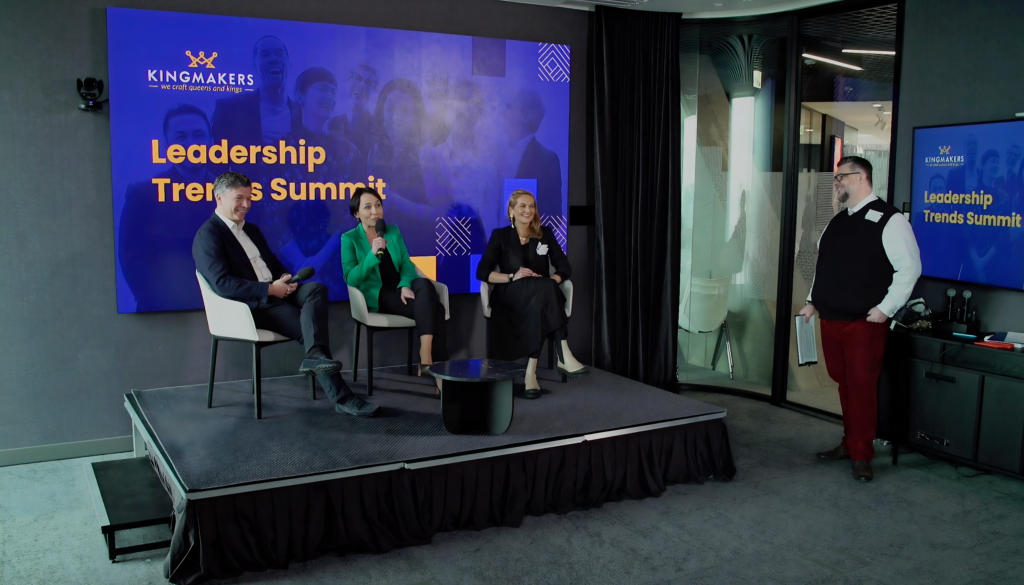
The selected topics aroused considerable interest among the participants, who were present in large numbers until the very end of the conference. Even after it was over, the discussions seemed endless, and the organizers collected congratulations for the success of the event. So at this point, it is worth thanking the speakers and panelists once again for their participation in the event and their openness in sharing their own experiences.
This satisfaction of the participants and their confirmation of the relevance and usefulness of the topics covered were certainly a great reward and motivation for the entire Kingmakers team to organize the next edition of the Leadership Trends Summit next year.